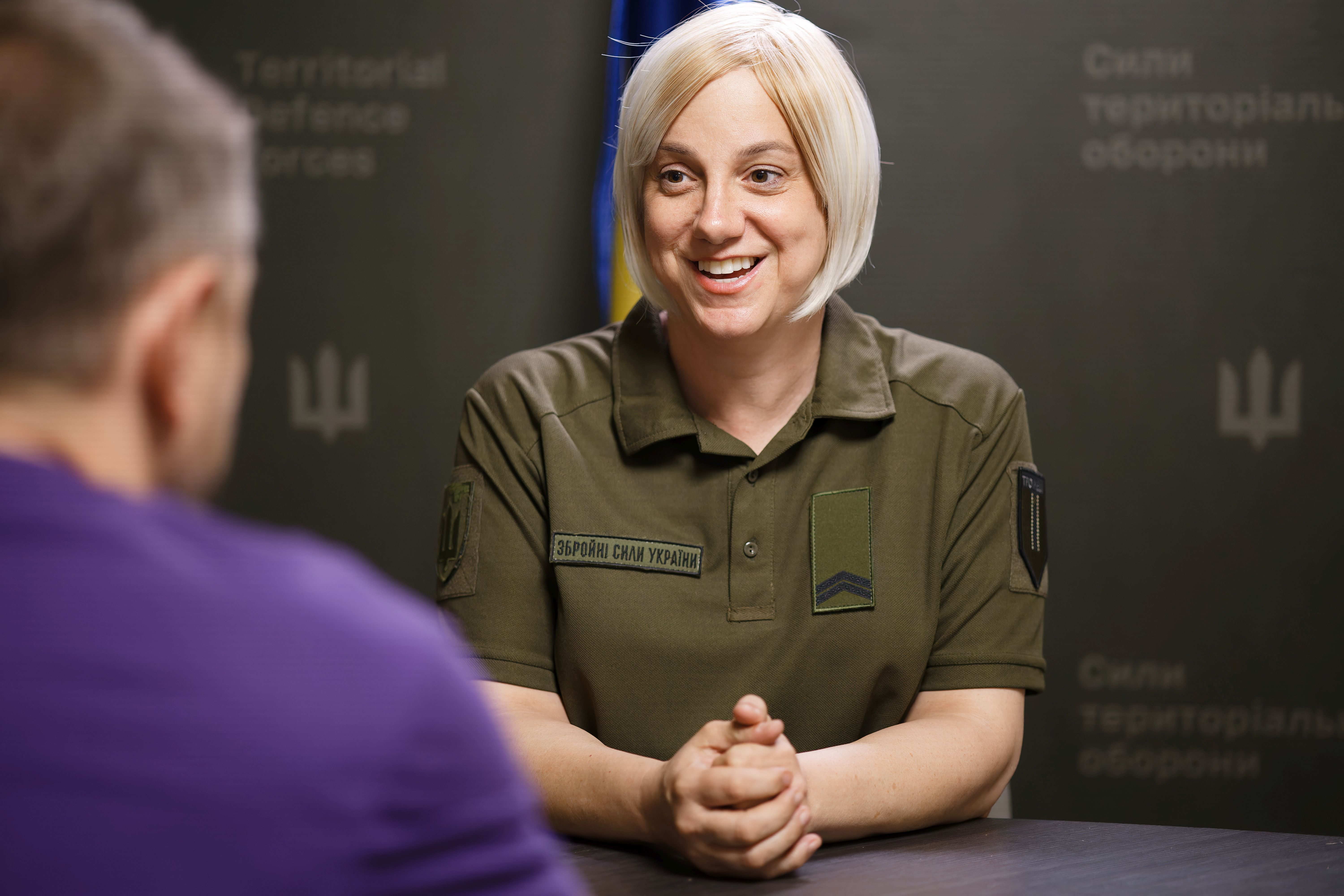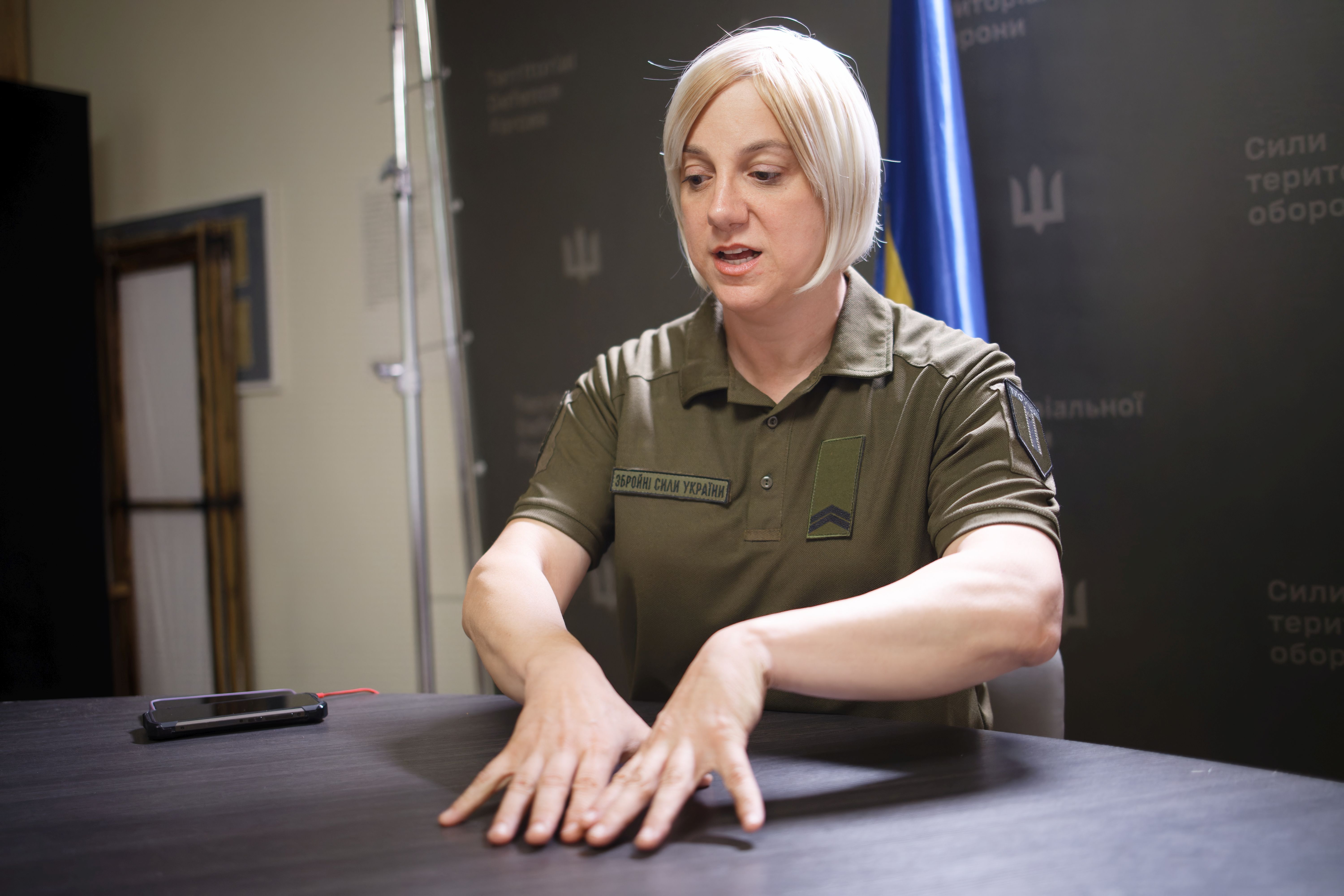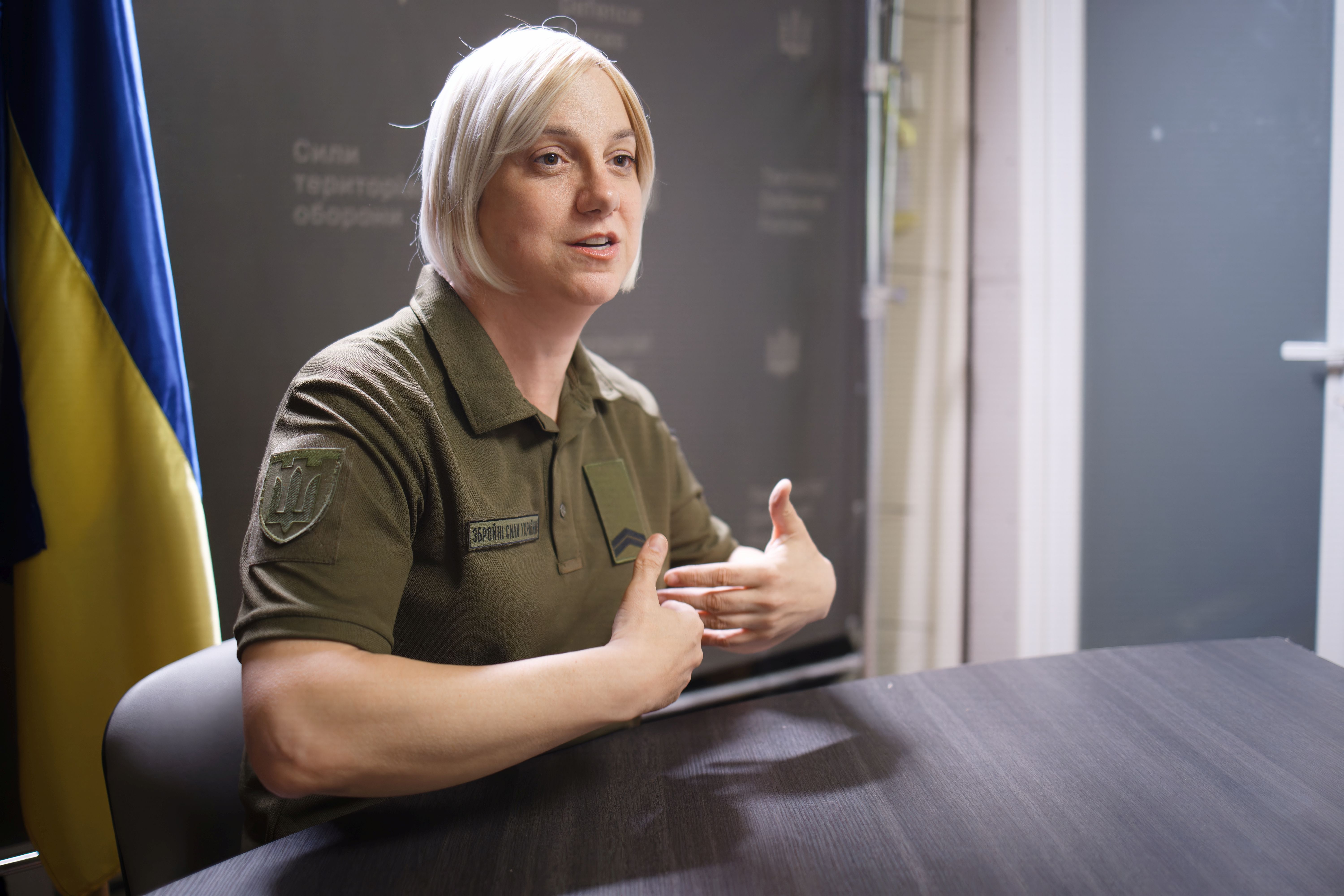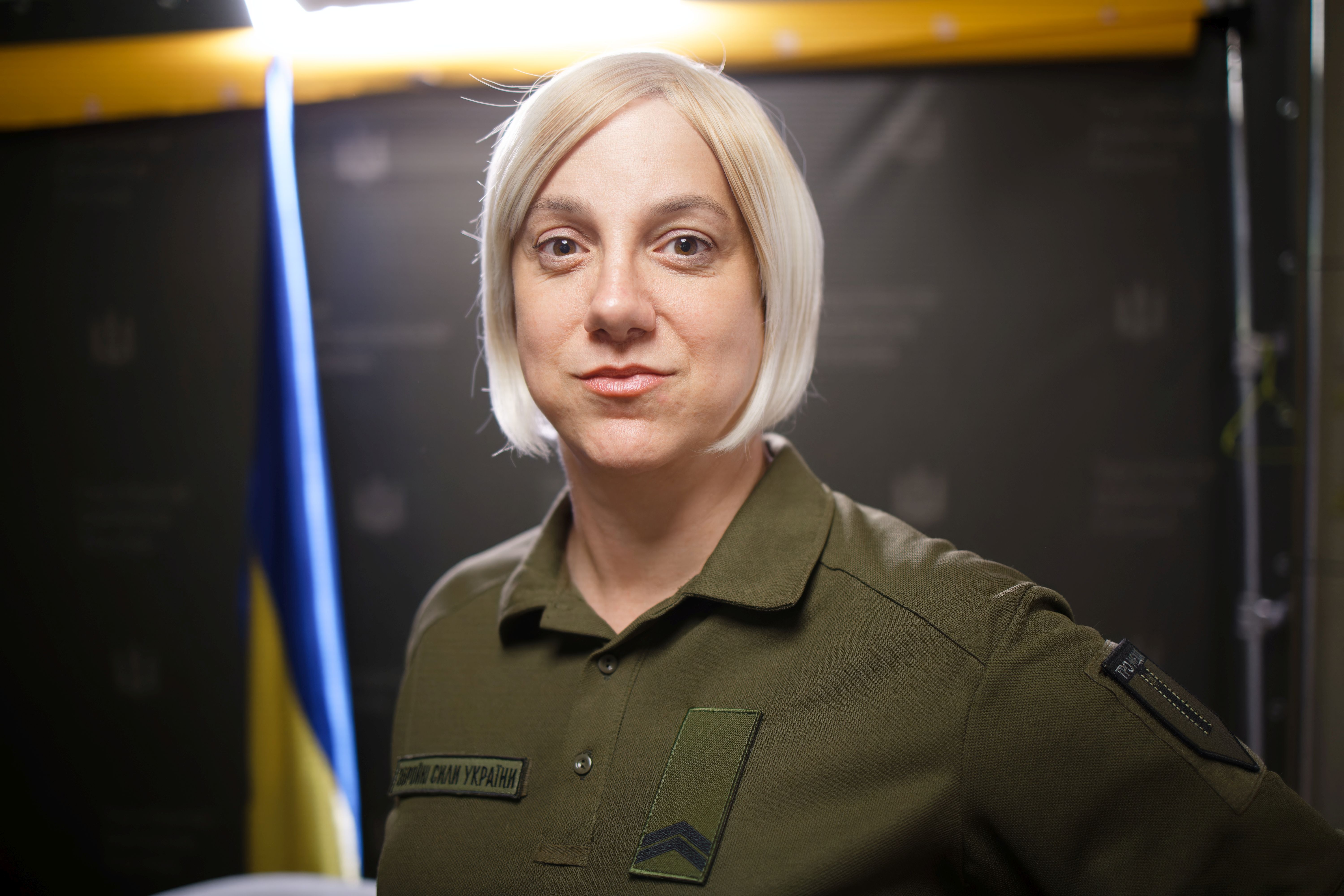Sarah Ashton-Cirillo from the Territorial Defence Forces: It's thanks to Ukraine that Russian chaos agents were exposed
Sarah Ashton-Cirillo, a 46-year-old American, is an ideal target for attacks by Russian propagandists. And no wonder, because Sarah is a transgender woman and a citizen of NATO's most powerful member who has joined the ranks of the Defence Forces of Ukraine. Sarah came to Ukraine as an activist and writer with an interest in refugee issues and the humanitarian crisis.
She settled in Northern Saltivka in Kharkiv and went from being a reporter and representative of the mayor of Zolochiv to serving as a medic in the Noman Celebicihan Battalion. Sarah was appointed the official spokesperson for the Territorial Defence Forces in August this year for communications with the Western audience. This generated even more interest in her in the Russian Federation.
Advertisement:The highest point of the propaganda was a recent statement by Ashton-Cirillo in a rather extravagant style: "Next week, the teeth of the Russian devils will gnash ever harder and their rabid mouths will foam in uncontrollable frenzy as the world will see a favorite Kremlin propagandist pay for their crimes.
And this puppet of Putin is only the first. And justice will be served..." The Russians announced to the world on every possible platform that Ukraine wants to "kill journalists".
And Senator J.D. Vance, a Republican who has advocated ending "unlimited aid" to Kyiv, asked high-ranking officials, including Antony Blinken, to find out who Sarah Ashton-Cirillo is, even though Sarah is an active user of social media, where she has previously made emotional appeals to Russian propagandists. The Territorial Defence Forces command has suspended Sarah from her position pending an official investigation into her statements, but Ukrainska Pravda journalists happened to have recorded this interview before that.
Sarah subsequently commented that yes, she has been suspended and there is an investigation pending, but she is still serving in the force. In this interview, Ashton-Cirillo told Ukrainska Pravda how Ukrainians have surprised the world, whether society in the US continues to support Ukraine, and how effective Russian propaganda is in the West now.
"I didn't expect something so future-thinking"
Sarah, why are you here in Ukraine? I came one week after the full-scale invasion.
The idea was only to come for two weeks, to go to Przemysl and maybe Lviv. I had studied and worked on and covered as a writer the Syrian and Afghani refugee crisis in 2015-2016. This was my chance to come and compare the Ukrainian humanitarian crisis to what I saw with the Syrian.
Was it the first time you had been to Ukraine? Yes. I had spent a lot of time in Latvia, in Riga, and in Tallinn, Estonia, too, so I was very familiar with the evils of Russia.
I knew more about Ukraine than maybe many people from the United States, but I was not a student of Ukraine. For me, Ukraine was 2004, of course, 2014, Crimea and Chornobyl. When I came for two weeks, I knew that the Ukrainian people were most definitely suffering because what we were seeing was the exact same issues that happened in the Baltics in the 1930s and 40s, and what happened with the Tatars in the 1940s: filtration, deportation, and the spread of the Russian language in territories that were not Russia.
And so when I came over, I said, "I will spend two weeks covering refugees, I'll create a new write-up regarding the compare and contrast between the Syrian situation and the Ukrainian situation, and then I will go back to covering US politics." Obviously, that did not happen. (laughing) On the train from Berlin to Poland, I met Olena, a doctor from Ivano-Frankivsk, who had been out of the country [before the invasion - UP] and was returning to Ukraine to teach at the university and practice medicine again. She said: "As soon as you get accredited, promise me I'll be your first interview."
I was in Lviv for five days, and I got my accreditation and headed to Ivano-Frankivsk. And that's where my world changed. I was in Ivano-Frankivsk, and I was approached by a couple of men from Kharkiv.
They asked if I was a journalist and if I wanted to cover the war. I didn't know anything. This was an incredible opportunity, and I was so scared.
I asked Olena: "What do I do? These men said they were leaving [for Kharkiv - UP] in an hour." And she said, "You have to go. You have to go and tell the world about the war."
I ended up not leaving Kharkiv Oblast for about six and a half months.
 "I'm only here because Ukrainians continue the fight against Russian terrorism"
"I'm only here because Ukrainians continue the fight against Russian terrorism"
Did you have any stereotypes about Ukraine? I thought it was two extremes. My thinking was: either farmers or high-tech.
I didn't realize until I got here that it was truly a European style: every type of writer, and filmmakers, and so many universities. So yes, you have the farms, and you have the high-tech. But then you have this entire fabric of society that I was not expecting.
I didn't know what I was expecting, but it was not something so future-thinking.
"I'm not going to be neutral"
Have you ever experienced gender discrimination in Ukraine? No, not from my transition. I think there were certain gentlemen who believed that war is more traditional for men versus women.
I've written about this. I've been given opportunities as a female that maybe guys wouldn't get, but other times [before serving in the army], I've wanted to go and cover reporting, and I've not been taken along. Now, this is not the case.
I have never faced discrimination because of my particular story. Not with the Crimean Tatars, not with the town of Zolochiv, a very traditional town in northern Kharkiv. Commander [Lenur] Islamov, a man who's been involved in many things against the Russians, welcomed me; all the Tatars welcomed me when I first enlisted.
And then, not since joining the Kharkiv Defence Force either - you know, living in the trenches with the guys... never any issues. I sometimes read certain messages, but to my face or in my opportunities - truly never. I push an agenda of freedom for people, but not this (pointing to her face - UP).
And then, for the last month and a half (since Sarah was appointed TDF spokeswoman - UP), it's what almost everyone wants to speak of. And I think it's silly. Because first I'm a soldier, and second time a journalist or analyst or whatever my profession would be, and third, I'm a human being.
Do you follow what Russian propaganda writes about Americans in Ukraine, and about you? And how do you feel about it? It's interesting because one of our roles here at Territorial Defense Forces media is actually to encounter and to uncover Russian propaganda, to counter Russian propaganda and to push back against it.
That's where the name of the show Russia Hates the Truth comes from. For instance, one of the latest controversies [was when] I said, and I repeated it, "We are going to hunt down Russian propagandists and bring them to justice, 100%." They took that and turned it into: "Sarah Ashton is a terrorist who said she's going to kill Russian journalists." No, I didn't say that, 100%.
 "I came across news headlines from 1982 where Russia accused the US of creating biolaboratories. In 1982!
"I came across news headlines from 1982 where Russia accused the US of creating biolaboratories. In 1982!
They make up the same lies over and over again."
Once they made a "screenshot of my correspondence" [in which Sarah seems to be advocating for the mass enlistment of women - UP]. I immediately wrote to the Department of Strategic Communications [of the Ministry of Defence - UP]: "Photoshop appeared!" By the next morning, it was on Russian television. So the first thing is to understand that it's not personal.
I don't take any of the attacks on me personally. The last time I took an attack on me personally was the first attack on me. In April 2022, Maria Zakharova [spokeswoman for the Russian Foreign Ministry] posted about me.
And I cried because I thought it was the end of the world (laughing): the Russians were attacking me. And the man who brought me to Kharkiv from Ivano-Frankivsk said, "This is the best thing that could have happened. Now, what you need to do is take everything you're doing and make it louder and more in your face."
After this situation with Zakharova for the first time, I went from being scared and crying that I had done something wrong to being like, "Oh. This is informational warfare." And because I had already seen six or seven weeks of Russian terrorism against the people of Kharkiv, I had no problem saying, "I'm not going to be neutral..." You can't be neutral in this war if you're watching it every day, and every day in Kharkiv in March and April [there were] so many deaths, so many fires, so many rockets. The only way to beat the Russians is to punch them back, to put it in their faces, to put it in the face of the world.
We can't be scared of the Russians, especially the Russian propagandists. They're just paid mercenaries, but unlike having a rifle in their hands, they're paid for their tongues. And that's why we can't care about what they say on a personal level.
We just have to expose them for who they are, which are war criminals. And how strong is Russian propaganda now in the USA and Europe? Not as strong as it was.
Russians try to create chaos. In 2015-2016 we saw this from many investigations. Yevgeny Prigozhin was on the most wanted list because of his disinformation campaigns. They were very good at coming in through social media, which was not prepared to understand what was about to happen, and they weaponized social media.
Eight years later - forget for a moment the situation with Twitter, with X (laughing) - but all the other social media outlets are putting up blockades to not allow the Russians to create that confusion and to create that chaos on their channels. They put out Russia Today, but everyone knows Russia Today is propagandist. Well, at least in the US.
It doesn't run on cable channels any more. And in the US, people have become more aware, especially since the full-scale [invasion], where a lot of the sanctions are affecting the people who are getting paid by Russia Today or the people who are getting paid by Sputnik or TASS. We've managed, thanks to Ukraine exposing Russian chaos agents to the world.
The United States and our other partners have done a very, very good job of at least trying to contain, maybe not stop it, but contain it, and that has been a tremendous help during this full-scale [invasion].
"I voted for Joe Biden"
You criticized Joe Biden's victory, didn't you? No. That's what they say on the internet.
On Wikipedia (laughing)? No. I've criticized Joe Biden, I'll do it right now.
I would ask them [the Biden administration] politely to send the weapons sooner and faster: the ATACMS, and the depleted uranium, and all the other weapons we need. But as for voting, no, I voted for Joe Biden. I have many friends who are Republican.
Many friends. It's a weird situation. My closest friends are Republicans.
Some of my closest friends know former President Trump very well. Ultimately, for me, I would consider myself a very center-left person because I'm a big believer in individual freedom. I hate communism.
I find socialism to be very disgusting. But I did vote for Joe Biden in the last election. But I voted for many Republicans in other, different elections.
That's the situation. The controversy with me and the situation with Republicans and Democrats is because I do have so many close Republican friends. But then there were some very far-right people in the Republican Party in Nevada, very far right, who were antisemitic.
In the end, seven people who were involved in the party were expelled for being antisemitic and for being racist. And when I speak to them [Republicans], it's not about domestic policy in the United States. It's "How do we work together to guarantee that Ukraine is going to be liberated and Russia is going to be stopped?"
And I said to another news outlet, "I don't know who I'm going to vote for in the next election in 2024. It could be a Republican. It could be a Democrat.
Just because somebody has a party next to their name does not mean I will vote for them or vote against them." What do you think about the US's support of Ukraine right now? A poll came out from CNN that made it look like support was dropping.
The headline was "More than 50% of the US is no longer supporting Ukraine weapons delivery". But if you look at three other questions they asked in the same poll, all three of them point to the overwhelming majority of Americans supporting Ukraine and looking at Russia as an enemy. As the US elections approach, public support for Ukraine remains relatively stable.
The problem is that on a list of ten items, the issue of Ukraine may be seventh or eighth in importance for Americans. So, if you ask them just in general, "Do you support Ukraine against Russia?" Yes. "Do you want to see Ukraine free?" Yes. But it's less important than gas prices.
It's less important than immigration in the United States. While the US Congress on the Republican and Democratic sides and President Biden's Administration all support Ukraine overwhelmingly, they also have to look at domestic issues. The American voter is not voting for people based on the Ukraine policy.
They are voting for people based on what are you doing for interest rates, and what are you doing for inflation. We in Ukraine are afraid of the results of the next elections. Is it possible that a win for Trump will be game over for us?
I'll say this about President Trump. President Trump likes to support winners. If former President Trump becomes president again, I have full expectations that we will have completely liberated Ukraine by January 2025.
President Trump will see this, and he will understand that supporting the Ukrainian people and rebuilding Ukraine makes the most sense for the United States, makes the most sense for Ukraine, and makes the most sense for President Trump's legacy. Right now, there are a lot of people in the US who still may question, "Will we fully return to the country's 1991 borders here in Ukraine?" Once we show the world that we haven't just succeeded with this ongoing offensive, but that we have fully liberated the country, the world is going to say, "This is a country that can accomplish anything. Let us make sure we get behind Ukraine in the restoration and their rebuilding."
 "It's going to be so clear to American and European policymakers that we have either achieved complete liberation or we are about to achieve complete liberation.
"It's going to be so clear to American and European policymakers that we have either achieved complete liberation or we are about to achieve complete liberation.
They'll almost be fighting to get behind Ukraine in rebuilding"
"Turn suffering into strength"
What should we tell Europeans and Americans about this war? Trust our Ukrainian commanders. Don't listen to the noise of the people who want to give their opinions.
No one can truly understand what's happening at the front except for a handful of people. If we look at what happened in Kharkiv one year ago, everyone was doubting us, saying, "How can they call it the Kherson counteroffensive? They've only taken back a couple of villages." And then we took Kharkiv in approximately 19 days, and then we took Kherson, almost all of it.
This message is simple: trust the Ukrainian liberation to Ukrainian commanders and the Ukrainian people. Give us your support. Give us your strength.
But leave the doubting for the history books. General Zaluzhnyi, General Syrskyi, President Zelenskyy were all very clear. The war is not won in an hour.
We've been at this for nine and a half years. And that's what I beg everyone who asks me why things are going at a pace that they don't expect: because Ukraine and the commanders that we have are going at a pace that makes sense for us to be able to completely liberate the country, not to get fancy headlines. Are there any things about this war, or about Ukrainians, that are still difficult for Europeans and Americans to understand?
We are beating what was considered the second-strongest army in the world. They're not, clearly. The second-strongest army in the world is Ukraine.
No doubt about it. We are beating them in tennis shoes (laughing). We're beating them with men and women who were school teachers, who were professors, who were bakers.
So look at what we're accomplishing and be surprised by what we're accomplishing with guys and women fighting in tennis shoes and fighting with Kalashnikovs from 1974. We know how to win. Imagine what we could do if we had all the weapons that have been talked about or promised to us.
It's because we have better leadership. And we have men and women who are fighting to make sure they're not enslaved. That's what would surprise the Europeans and the Americans if they saw it: they could not believe the spirit that takes place inside the Ukrainian soldiers and the Ukrainian civilians who are assisting us.
 "You don't have to be wearing the uniform of the ZSU [the Armed Forces of Ukraine] to be a Ukrainian hero and to be taking part.
"You don't have to be wearing the uniform of the ZSU [the Armed Forces of Ukraine] to be a Ukrainian hero and to be taking part.
So that's what would surprise the world. It's that every single man and woman across this country has come together despite not having the equipment, not having the supplies, not having the training, and are beating what was presumed to be the second-strongest army in the world."
Is there anything US society can learn from Ukrainian society? Understand how to do more with less.
In the United States especially, we're used to things being disposable. "Oh, this is not working. I'm going to throw it out and buy something new." We don't have that luxury here in Ukraine. If something's broken, you fix it, or you make it work in a way that you don't have to go out and replace it.
We had fuel shortages in Kharkiv. We still managed. Again, it's how you take this tremendous suffering and turn it into something positive, versus looking in the mirror and saying, "Life is so bad."
It's the opposite of what some people would think of as today's society. We take the suffering, and we find strength in it, and that's what people could look at regarding the Ukrainian people - how to turn suffering into strength. Do you believe in Ukraine's victory?
100%. I saw how in Kharkiv, when the Russians surrounded the city, people continued to live despite the shelling of Saltivka and the city center. When I saw that the people continued to live, although we were under constant terrorism and constant war crimes every day, to me, that showed that victory was inevitable.
Because the people would never be broken. If the people of Kharkiv were like this six, seven, eight months into the war, then I knew the people of Melitopol were like this, the people of Berdiansk were like this, the people of temporarily occupied Zaporizhzhia were like this, and clearly in my experiences under Commander Islamov, I understood the people of Crimea were some of the most fierce resistance fighters as well. They were never going to break until they were liberated from the enemy.
What makes you happy in Ukraine? That the Ukrainian command trusted me to be in this position. It's the greatest honor.
It makes me so happy to see Kyiv - alive. It makes me so happy to see Kharkiv alive. That makes me happy every day.
We're fighting so people can live. I know that Ukrainian people support us. But they don't have to live the war.
It makes me happy to see them living life. Yevhen Rudenko, Dmytro Larin (photo) - UP Translation and transcription: Sofiia Kohut, Myroslava Zavadska and Tetiana Buchkovska
Editing: Teresa Pearce